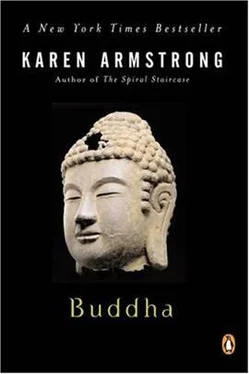There is a sense in which this is true of any major religious figure. Modern New Testament scholarship has shown that we know far less about the historical Jesus than we thought we did. “Gospel truth” is not as watertight as we assumed. But this has not prevented millions of people from modeling their lives on Jesus and seeing his path of compassion and suffering as leading to a new kind of life. Jesus certainly existed, but his story has been presented in the Gospels as a paradigm. Christians have looked back to him when delving into the heart of their own problems. Indeed, it is only possible to comprehend Jesus fully if one has in some sense experienced personal transformation. The same is true of the Buddha, who, until the twentieth century, was probably one of the most influential figures of all time. His teaching flourished in India for 1,500 years, and then spread to Tibet, Central Asia, China, Korea, Japan, Sri Lanka and Southeast Asia. For millions of human beings, he has been the person who has epitomized the human situation.
It follows that understanding the Buddha’s life, which is to an extent fused with his teaching, can help us all to understand the human predicament. But this cannot be the sort of biography which is usually written in the twenty-first century; it cannot trace what actually happened or discover controversial new facts about the Buddha’s life, since there is not a single incident in the scriptures that we can honestly affirm to be historically true. What is historical is the fact of the legend, and we must take that legend whole, as it had developed at the time when the Pali texts took their definitive shapes about a hundred years after the Buddha’s death. Today, many readers will find aspects of this legend incredible: stories of gods and miracles are interspersed with the more mundane and historically probable events in Gotama’s life. In modern historical criticism, it is usually a rule of thumb to discount miraculous events as later accretions. But if we do this with the Pali Canon, we distort the legend. We cannot be certain that the more normal incidents are any more original to the legend than these so-called signs and wonders. The monks who evolved the Canon would certainly have believed in the existence of the gods, even though they saw them as limited beings and, as we shall see, were beginning to regard them as projections of human psychological states. They also believed that proficiency in yoga gave the yogin extraordinary “miraculous” powers ( iddhi ). The yogic exercises trained the mind so that it could perform exceptional feats, just as the developed physique of the Olympic athlete gives him powers denied to ordinary mortals. People assumed that an expert yogin could levitate, read people’s minds and visit other worlds. The monks who compiled the Canon would have expected the Buddha to be able to do these things, even though he himself had a jaundiced view of iddhi and felt that they should be avoided. As we shall see, the “miracle stories” are often cautionary tales, designed to show the pointlessness of such spiritual exhibitionism.
Many of the stories recorded in the Pali scriptures have an allegorical or symbolic meaning. The early Buddhists looked for significance, rather than historically accurate detail, in their scriptures. We shall also find that the later biographies, like the one found in the Nidana Katha, give alternative and more elaborate accounts of such incidents as Gotama’s decision to leave his father’s house, or his enlightenment, than the more sparse and technical narratives in the Pali Canon. These later stories too are even more rich in mythological elements than the Canon: gods appear, the earth shakes, gates open miraculously. Again, it would be a mistake to imagine that these miraculous details were added to the original legend. These later consecutive biographies were probably based on that lost account of the Buddha’s life which was composed about a century after his death, at the same time that the Canon took its definitive form. It would not have worried the early Buddhists that these overtly mythological tales were different from those in the Canon. They were simply a different interpretation of these events, bringing out their spiritual and psychological meaning.
But these myths and miracles show that even the Theravadin monks, who believed that the Buddha should simply be regarded as a guide and an exemplar, were beginning to see him as a superman. The more popular Mahayana school virtually deified Gotama. It used to be thought that the Theravada represented a purer form of Buddhism and that the Mahayana was a corruption, but, again, modern scholars see both as authentic. The Theravada continued to stress the importance of yoga and honored those monks who became Arahants, “accomplished ones” who, like the Buddha, had achieved enlightenment. But the Mahayana, who revere the Buddha as an eternal presence in the lives of the people and as an object of worship, have preserved other values that are just as strongly emphasized in the Pali texts, particularly the importance of compassion. They felt that the Theravada was too exclusive and that the Arahants hugged enlightenment selfishly to themselves. They preferred to venerate the figures of the Bodhisattas, the men or women destined to become Buddhas but who deferred enlightenment in order to bring the message of deliverance to “the many.” This, we shall see, was similar to Gotama’s own perception of the role of his monks. Both schools had seized upon important virtues; both, perhaps, had also lost something.
Gotama did not want a personality cult, but paradigmatic individuals such as himself, Socrates, Confucius, and Jesus tend to be revered either as gods or as superhuman beings. Even the Prophet Muhammad, who always insisted that he was an ordinary human being, is venerated by Muslims as the Perfect Man, an archetype of the complete act of surrender ( islam ) to God. The immensity of the being and achievements of these people seemed to defy ordinary categories. The Buddha legend in the Pali Canon showed that this was happening to Gotama, and even though these miraculous stories cannot be literally true, they tell us something important about the way human beings function. Like Jesus, Muhammad, and Socrates, the Buddha was teaching men and women how to transcend the world and its suffering, how to reach beyond human pettiness and expediency and discover an absolute value. All were trying to make human beings more conscious of themselves and awaken them to their full potential. The biography of a person who has been canonized in this way cannot satisfy the standards of modern scientific history, but in studying the archetypal figure presented in the Pali Canon and its related texts, we learn more about human aspiration and gain new insight into the nature of the human task. This paradigmatic tale delineates a different kind of truth about the human condition in a flawed and suffering world.
But a biography of the Buddha has other challenges. The Gospels present Jesus, for example, as a distinct personality with idiosyncrasies; special turns of phrase, moments of profound emotion and struggle, irascibility and terror have been preserved. This is not true of the Buddha, who is presented as a type rather than as an individual. In his discourses we find none of the sudden quips, thrusts and witticisms that delight us in the speech of Jesus or Socrates. He speaks as the Indian philosophical tradition demands: solemnly, formally and impersonally. After his enlightenment, we get no sense of his likes and dislikes, his hopes and fears, moments of desperation, elation or intense striving. What remains is an impression of a transhuman serenity, self-control, a nobility that has gone beyond the superficiality of personal preference, and a profound equanimity. The Buddha is often compared to non-human beings-to animals, trees or plants-not because he is subhuman or inhumane, but because he has utterly transcended the selfishness that most of us regard as inseparable from our condition. The Buddha was trying to find a new way of being human. In the West, we prize individualism and self-expression, but this can easily degenerate into mere self-promotion. What we find in Gotama is a complete and breathtaking self-abandonment. He would not have been surprised to learn that the scriptures do not present him as a fully-rounded “personality,” but would have said that our concept of personality was a dangerous delusion. He would have said that there was nothing unique about his life. There had been other Buddhas before him, each of whom delivered the same dhamma and had exactly the same experiences. Buddhist tradition claims that there have been twenty-five such enlightened human beings and that after the present historical era, when knowledge of this essential truth has faded, a new Buddha, called Metteyya, will come to earth and go through the same life-cycle. So strong is this archetypal perception of the Buddha that perhaps the most famous story about him in the Nidana Katha, his “Going Forth” from his father’s house, is said in the Pali Canon to have happened to one of Gotama’s predecessors, Buddha Vipassi. The scriptures were not interested in tracing Gotama’s unique, personal achievements but in setting forth the path that all Buddhas, all human beings must take when they seek enlightenment.
Читать дальше












